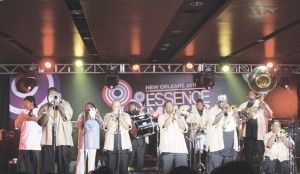A season of nominations and change…
16th December 2013 · 0 Comments
By Geraldine Wyckoff
Contributing Writer
Louisiana racked up a host of Grammy nominations and checking the list a few elements seemed to stand out. It is certainly rare, if not the first time, that a father and son were both nominated for an award in the same year in two different categories. Bishop Paul S. Morton got the nod in the Best Gospel Album division for his release Best Days Yet (Tehillah Music Group). Meanwhile his son, vocalist/pianist PJ Morton is up for an award for Best R&B Song for the cut “Only One,” which features Stevie Wonder. It’s off his album PJ Morton New Orleans on the locally founded Cash Money Records label.
Another realization is how much the music of the nominees symbolizes this city and state. For instance, trumpeter Terence Blanchard, who’s in the running for Best Improvised Jazz Solo for his blowing on “Don’t Run” from his album Magnetic (Blue Note), is a native of New Orleans, the birthplace of jazz. The Hot 8 Brass screams New Orleans and is vying for an award in the rather hodgepodge category of Best Regional Roots Music Album for its release The Life & Times Of… The Hot 8 Brass Band (Tru Thoughts). The brassy group is up against other uniquely Louisiana artists and styles, the zydeco of Terrance Simien & the Zydeco Express’ Dockside Sessions (Music Matters Records) and Zachary Richard’s Le Fou (Avalanche).
Few musicians are more synonymous with New Orleans than Allen
 Toussaint who was named in the Best Americana Album category for Songbook (Rounder Records). The legendary pianist/vocalist/composer was also nominated for the Best American Roots Song, “Shrimp Po-Boy Dressed” from that CD.
Toussaint who was named in the Best Americana Album category for Songbook (Rounder Records). The legendary pianist/vocalist/composer was also nominated for the Best American Roots Song, “Shrimp Po-Boy Dressed” from that CD.
Other native Louisianans receiving nominations were Bobby Rush in the Best Blues Album division for Down in Louisiana (Deep Rush Records) and Hunter Hayes for Best Country Solo Performance on “I Want Crazy” off his CD Encore (Atlantic).
The 56th Annual Grammy Awards will be held on Sunday, January 26, 2014.
Louisiana Music Factory Heading Downriver
For many locals, the Louisiana Music Factory is much more than just a record store. It represents New Orleans much in the way that community radio station WWOZ and Jazz Fest does. During its popular Saturday afternoon in-store performances it becomes a club house of sorts, a spot for music lovers to get together and hang out. So it was a bit of a concern when it was announced that in February 2014 the Music Factory would be changing its locale from upper Decatur Street downriver to 421 Frenchmen Street. Will the new store have a stage like the old one? Will it still carry vinyl? Will the sales staff stay?
“I’m not changing anything, I’m just moving down the street,” owner Barry Smith assures the store’s fans. “We’ll continue to have our in-stores though I haven’t figured out where things are going yet. I hope to accommodate everything that we’re doing here.”
Frenchmen Street seems a natural for a store that celebrates New Orleans music. Smith acknowledges that there will be fewer tourists passing his door during the day as there are in the French Quarter. He hopes that can be made up by people stopping in the store as they head to the many restaurants and clubs in the Marigny. To that aim, he’s looking to open a little later in the day – 11 am rather than 10 am – and stay open an hour later and later yet on Friday and Saturday nights.
This is the second move for the Louisiana Music Factory that first opened in February 1992 at 225 N. Peters Street, the present home of Coyote Ugly. Even then, the in-store performances were notable and some might remember the legendary guitarist/banjoist/vocalist Danny Barker playing there. In the summer of 1996, the Factory jumped a block to its present location at 210 Decatur Street, just across the street from the House of Blues that opened in 1994.
Smith says he kind of likes the idea that the new store, located beneath OffBeat magazine’s offices, will be all on one floor rather than two as it is now. He’ll take a slight loss in square footage going from 4,000 to 3,500 square feet but does get a break on the leasing cost.
And yes, as has been customary, Smith plans to make arrangements with one of the nearby bars to accept discount beer coupons during the hours of performances. He also wants to get one of the local breweries onboard in an official capacity.
The Louisiana Music Factory should be rollin’ on Frenchmen Street in plenty of time for Mardi Gras, March 4, 2014.
George H. Buck Jr.
December 22, 1928 – December 11, 2013
“My greatest pleasure is doing jazz,” George Buck once declared. As the owner, along with his wife Nina, of the Palm Court Jazz Cafe, a radio station impresario, record producer and label owner, broadcaster and magazine publisher, Buck was a keeper of the traditional jazz flame. George Buck died on December 11, 2013 at the age of 84.
Buck produced his first record in 1949 with reedman Tony Parenti and His New Orleanians on his own Jazzology label and in time headed eight record labels under the auspices of his GHB Foundation.
Because of his love of jazz, Buck collected radio stations and record labels with the same passion as he did recordings. Jazzology began as a live radio program Buck created in 1947 and it eventually aired in New Orleans on WTIX.
“The purpose of Jazzology was for permanent documentation of authentic jazz throughout the years,” he explained in a 2006 interview. We (the GHB Foundation) probably have the largest record catalog of jazz that was recorded in the ‘50s, ‘60s, ‘70s, ‘80s, ‘90s and into the 2000s.” Having acquired numerous other labels through the decades, it also boasts material dating back to the 1920s.
Buck initially bought the building at 1204 Decatur Street that houses the Palm Court as a warehouse to store his vast inventory of recordings. He moved from Atlanta to New Orleans in 1986, the same year that he and Nina were married.
While Nina took care of business and hosted at the Palm Court, a mecca for live, traditional jazz, her husband inconspicuously administered the multi-faceted elements of his GHB Jazz Foundation.
“Rhythm is our business,” Buck once, happily declared.
His business – his passion – enriched the world of jazz.
This article originally published in the December 16, 2013 print edition of The Louisiana Weekly newspaper.




